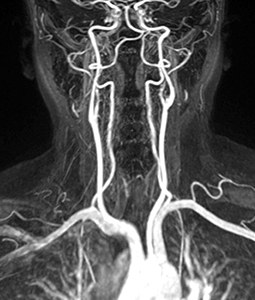MR Angiogram
 Magnetic resonance imaging is a procedure which uses a magnetic field and radio waves to produce 2D and 3D images of different structures in the body. When this method is used to take images of blood vessels in the body, it is termed as MR Angiogram. This method helps to diagnose any abnormalities or blockages in the blood vessels, and helps your doctor to plan your treatment based on the diagnosis.
Magnetic resonance imaging is a procedure which uses a magnetic field and radio waves to produce 2D and 3D images of different structures in the body. When this method is used to take images of blood vessels in the body, it is termed as MR Angiogram. This method helps to diagnose any abnormalities or blockages in the blood vessels, and helps your doctor to plan your treatment based on the diagnosis.
Indications and contraindications
MR Angiogram is indicated to diagnose diseases such as
- Congenital heart diseases (present at birth)
- Vasculitis: Inflammation (swelling or redness) of blood vessels
- Renal artery stenosis: Narrowing of arteries around the kidneys
- Atherosclerosis: Hardening of arteries in the arms and legs
- Dissections and aneurysms: Tearing or bulging of aorta
- Carotid artery disease: Blockages of blood vessels
You may not be eligible for the procedure if you are overweight, pregnant, or are on continuous life support. Having a pacemaker or any other metallic devices such as pins, joints, clips, or valves in your body may also hinder your eligibility to undergo this test.
Preparing for the procedure
Your doctor may advise you not to eat anything for 4 to 6 hours prior to the test.
Procedure
MR angiogram may be performed under sedation so that you lie still through the procedure and usually takes about 30 to 90 minutes. You will be asked to lie on the MR angiogram table which slowly slides through a hollow donut shaped chamber. This chamber exposes you to the magnetic field and radio waves. You may feel a little uncomfortable lying on the hard surface of the table, but otherwise the radio waves and magnetic fields are harmless. During the procedure, the technician interacts with you through a speaker present in the chamber. Sometimes, a contrast dye may be injected into your vein (in the arm) to increase the clarity of the images.
Post-procedure
After the MR angiogram procedure, you can resume your normal activities.
Complications
There are no major complications caused due to MR angiogram. However, there might be adverse reactions due to the contrast dye in rare cases.







